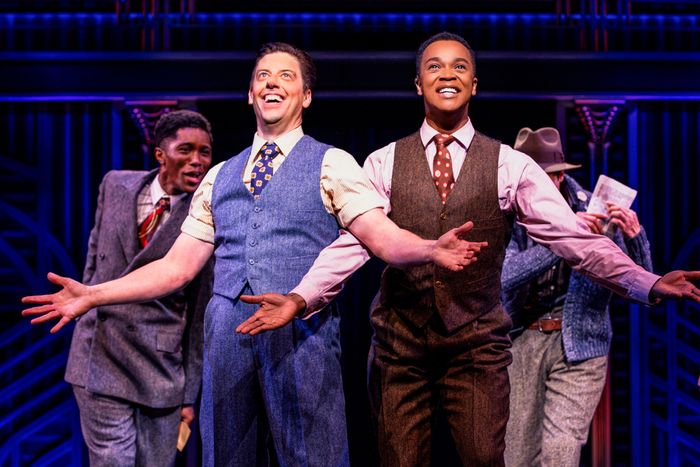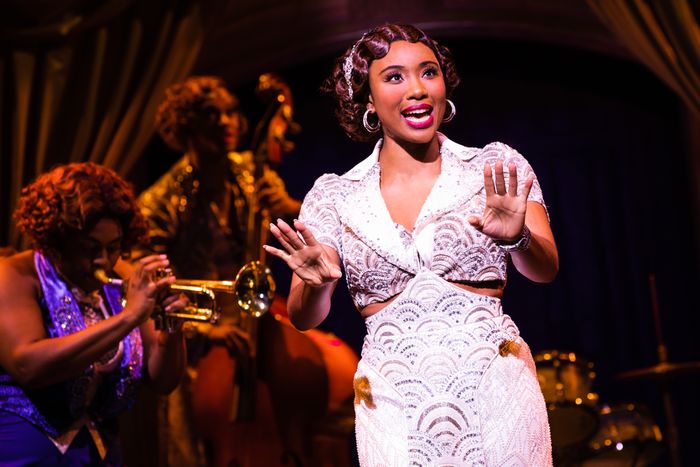
If you’ve already got the songs and the book for a stage musical, once you figure out the scene transitions, you’re most of the way to making it work. They’re one of the most difficult things in the genre, places where the momentum built up from a musical number can suddenly hit a wall during the shift into a book scene or vice versa. Mess them up, and suddenly there are crevices where your average ticket buyer might check out of their suspended disbelief for just long enough to ask, “Wait, why are these characters acting like this?” Whereas if you nail every segue from one bit of action to another, and keep the energy up with just enough time to acknowledge an applause break or two, the audience doesn’t have time to step outside the show and think intrusive thoughts. That’s the trick that director and choreographer Casey Nicholaw (he of the tap-dancing Elders in The Book of Mormon and the tap-dancing teens in Mean Girls) has mastered in the stage musical adaptation of Some Like It Hot. He’s fitted the show together so tightly it’s nearly vacuum-sealed. The production is relentlessly technically dazzling: Scene flows into song flows into scene flows into key change flows into dramatic set change flows into inevitable comedic tap-dance sequence flows into key change and on and on. By the end of it, all I could think is, Well, this is most of the way to being an incredible musical. It just needs to, you know, make you feel anything more than abstract admiration.
It has a lot to live up to: Billy Wilder’s 1959 comedy is one of the most endlessly rewatchable movies ever made. It has some of the era’s finest joke writing (I’m partial to Tony Curtis, as he’s pretending to know about water polo, saying he accidentally drowned two ponies) and it’s all sexed-up, as seen in Marilyn Monroe’s “Jell-O on springs” performance as Sugar, the band’s singer and ukulele player. In some ways, the story is an obvious fit for a stage musical, given the heightened premise and that, since it already features a band, there are natural places for songs. But adapting something that’s nearly perfect in another medium brings inherent risk. Back in 1972, Peter Stone, Jule Styne, and Bob Merrill tried it with Sugar (“a decently agreeable evening,” sniffed Walter Kerr in Walter Kerr in the Times). In 2022, here we are again, with a book written by the incongruous team of comedian and host Amber Ruffin and Matthew López of famously hilarious The Inheritance and music and lyrics by the Hairspray/Catch Me If You Can/Smash duo of Marc Shaiman and Scott Wittman.
They’ve all manicured the source material, taking an approach that puts it right in line with the rest of the recent Broadway adaptations of film comedies where men dress up as women as part of some larger scheme. (It is wild that a mini-genre that’s so specific exists, but here we are, following Tootsie in 2019 and Mrs. Doubtfire in 2021.) Each dances around dated aspects of the original’s humor while clinging onto that humor’s premises. Some Like It Hot is far and away the best of the bunch, perhaps because the film itself has subversive ideas about gender, production code notwithstanding, that can be teased out into something more explicit. In the film, Jack Lemmon’s character Jerry starts to feel comfortable in the persona of a woman named Daphne while being wooed by the millionaire Osgood (leading to Joe E. Brown’s indelible “Nobody’s perfect!” ending). Onstage, played by J. Harrison Ghee, the Jerry/Daphne character finds real euphoria in playing a female role, and they eventually embrace a non-binary identity, by way of a showstopping second-act number called “You Coulda Knocked Me Over With a Feather” that has Ghee belting to the rafters. The message is delivered heavy-handedly, maybe, but it’s not a bad one to get across.
That still leaves Joe, who disguises himself as Josephine and uses that cover to get all the closer to Sugar. The musical retains that plot, of course, but also keeps reminding the audience that Joe’s schemes are no good, and that ends up draining all the sex out of this sex comedy. Christian Borle, one of our most thoroughly honey-baked hams, takes that part over from Tony Curtis, and plays to the audience for yuks wherever possible— pretending to be a German screenwriter to woo Sugar, and taking the opportunity to go all-in on a kooky accent. (There must be a German word for “too many fake German word jokes.”)
Across from him, Adrianna Hicks, ex-ex-wife in Six, has turned Sugar into less of a ditz and more of a starry-eyed dreamer who hopes to make it big in the movies. (The producers decided early on to cast a Black woman as Sugar, and the show modeled the character’s persona after Lena Horne.) The storm metaphors abound in her songs, though Shaiman and Wittman, perhaps still haunted by the ghost of Marilyn from working on Smash, have written her an early solo that can’t help recall “They Just Keep Moving the Line” (and then they kick off the second act by straight-up reusing Smash’s “Let’s Be Bad”—though, to be fair, that is just a fun song). Hicks’s voice seems to contain an entire brass band, and she can pull off a key change with ease, though her best number is the relatively quieter “At the Old Majestic Nickel Matinee.” It’s a melancholy monologue about falling in love with the movies despite the fact that “not one vamp or Wall Street wife/ Held up a mirror to my life,” and it gives Sugar’s Hollywood dreams more motivation. The only problem is that, within the confines of the plot of Some Like It Hot, there isn’t much room for Sugar to act on those dreams. Once she’s caught up with Joe’s fake German, you feel all the worse for her now that he’s stringing her along with the promise of movie roles. She’s too well-actualized to be stuck with this dummkopf.
These are all the sorts of calculations that you start to ponder after the fact, however, because in the moment, Some Like It Hot is working so hard in front of you. Nicholaw runs his spry ensemble through production number after production number, at one point executing a door-slamming chase sequence that brings Scooby-Doo to the stage. The supporting performers bring their all, especially NaTasha Yvette Williams as the swaggering bandleader Sweet Sue and Angie Schworer as her befuddled second-in-command. Gregg Barnes’s costumes gleam, and Scott Pask’s sets glimmer. But somewhere amid all the careful noting and updating of the original, Some Like It Hot’s fire has been dimmed. It’s easier to note all the ways the show doesn’t do anything wrong than the ways it executes new ideas of its own. There’s only so much you can get from something so on the defensive about its own existence. Everything goes so smoothly that there’s hardly any friction at all—and you need friction to generate heat.



